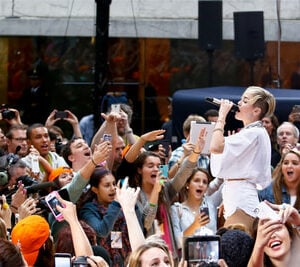In this episode of Stuff You Should Know About IP, Thomas Colson and Raymond Guarnieri welcome special guest Rob McLaughlin to discuss a trademark case from the European Union that involves Miley Cyrus. Tom Colson loves Miley Cyrus. Miley Cyrus and her company, Smiley Miley, Inc., sought to register the trademark her name (“Miley Cyrus”), but another company that already had a trademark on “Cyrus” opposed Miley’s registration. There was some overlap in the products offered by the respective entities. Typically, trademark law concerns the question of whether consumers will be confused as to who makes or sells a particular product. In the EU, even when two trademarks look and sound very similar, if there is conceptual difference between them – i.e., if the two marks mean completely different things – then consumers will not be confused between the two marks, and the conceptual difference can override the other similarities between the marks. A trademark owner is usually able to prevent others from using the same trademark or a similar trademark on the exact same goods or similar goods in the country that granted the mark, however it is possible to register a trademark throughout the entire EU. A trademark registration can be opposed at the European Union Intellectual Property Office, or the EUPIO. Legal proceedings involving trademark issues can be time-consuming and expensive, especially if there are appeals. In this case, Miley Cyrus filed her registration in 2014, and the entire process took around seven years. Because Miley Cyrus is a famous individual, there is conceptual difference between her name, “Miley Cyrus,” and “Cyrus.” Unlike some celebrities who are sometimes known only by their last names, Miley Cyrus is not known simply as “Cyrus.” Initially, the Opposition Division at the EUIPO rejected Miley Cyrus’s application. Miley then appealed that decision to the Board of Appeal, but the Board upheld the Opposition Division’s decision. Miley Cyrus then appealed that decision with the General Court, and the General Court ruled in favor of Miley because she is famous and there is therefore conceptual difference between “Miley Cyrus” and “Cyrus” in the minds of consumers.

![What is a Miley Cyrus? – Ep. 36 [Podcast] What is a Miley Cyrus? – Ep. 36 [Podcast]](https://www.executiveip.com/wp-content/uploads/maxresdefault-4-710x300.jpg)

![Artificial Intelligence = Inventor on a Patent? – Ep. 35 [Podcast] Artificial Intelligence = Inventor on a Patent? – Ep. 35 [Podcast]](https://www.executiveip.com/wp-content/uploads/ai_thumb-480x300.jpg)

![Trump Class Action Lawsuit: A Win for Copyrights – Ep. 34 [Podcast] Trump Class Action Lawsuit: A Win for Copyrights – Ep. 34 [Podcast]](https://www.executiveip.com/wp-content/uploads/trump_class_thumbnail-710x300.jpg)

![NFT Bragging Rights & IP Ownership – Ep. 33[Podcast] NFT Bragging Rights & IP Ownership – Ep. 33[Podcast]](https://www.executiveip.com/wp-content/uploads/Ep-33--710x300.jpg)

![Should Big Pharma Give Up COVID-19 Vaccine Patent Rights? – Ep. 32 [Podcast] Should Big Pharma Give Up COVID-19 Vaccine Patent Rights? – Ep. 32 [Podcast]](https://www.executiveip.com/wp-content/uploads/ep-32-2.0-710x300.jpg)